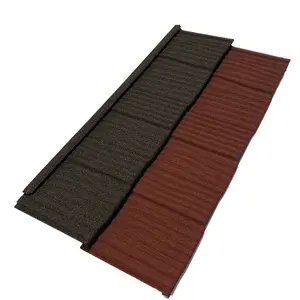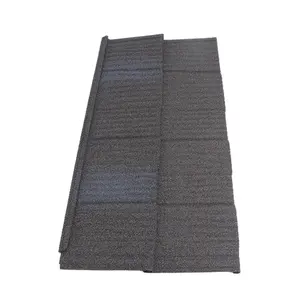
All categories
Featured selections
Trade Assurance
Buyer Central
Help Center
Get the app
Become a supplier

(20720 products available)















































Flat interlocking roof tiles are designed to fit into each other, creating a secure and weather-resistant roof. Their interlocking feature makes them ideal for sloped roofs, providing additional durability and protection against harsh weather conditions. Here are the different types of flat interlocking roof tiles:
Concrete interlocking roof tiles
Concrete interlocking roof tiles are made of sand, cement, and pigments. They have a flat and interlocking design, with each tile having a ''male'' edge that fits into the ''female'' edge of the adjacent tiles. They are durable roof tiles that require minimal maintenance. They are fire-resistant and non-combustible. These tiles are cost-effective and environmentally friendly. Their installation is simple since no adhesive or mortar is required.
Clay interlocking roof tiles
Clay interlocking roof tiles are made from natural clay, which is shaped and baked at high temperatures. They have a flat and interlocking design, with each tile having a ''male'' edge that fits into the ''female'' edge of the adjacent tiles. These interlocking roof tiles are durable and long-lasting. They need little maintenance and have high aesthetic appeal. They are fire-resistant and non-combustible. Their installation is simple since no adhesive or mortar is required.
Metal interlocking roof tiles
Metal interlocking roof tiles are made of steel; aluminum is lightweight, durable, and corrosion-resistant. They are designed to look like traditional roofing materials, such as shingles or tiles, but with the added benefits of metal. Their overlapping and locking mechanism makes installation easy and provides excellent weather resistance. They are durable and long-lasting.
These interlocking tiles need little maintenance. They are lightweight and energy-efficient. Their installation is simple since no adhesive or mortar is required.
Bituminous interlocking roof tiles
Bituminous interlocking roof tiles are made from a base material (usually fiberglass or organic matter) coated with asphalt and mineral granules. They have a flat and interlocking design, with each tile having a ''male'' edge that fits into the ''female'' edge of the adjacent tiles. They are durable and weather-resistant. These tiles need little maintenance.
They are cost-effective and easy to install. Their installation is simple since no adhesive or mortar is required.
Interlocking roof tiles have several important functions and features that make them an excellent choice for roofing. These include:
Flat interlocking roof tiles are durable and long-lasting
Flat interlocking roof tiles are made from strong materials like concrete or clay. These materials can withstand weather elements. They are not easily damaged by high temperatures, strong winds, or heavy rain. These tiles can also resist rust, rot, and insects. This allows them to remain intact for many years, sometimes up to 50 years or more. Their durability means they rarely need to be replaced or repaired. This makes interlocking roof tiles a cost-effective option.
Interlocking roof tiles are weather-resistant
Interlocking roof tiles are weather-resistant. Their design allows them to slide and lock together. This creates a roof that is almost like a solid surface. Roofs with interlocking tiles can shed water quickly. This prevents water from pooling on the roof and reduces the risk of leaks. The interlocking design also keeps the tiles in place during strong winds. This prevents them from blowing off the roof. Some interlocking tiles can also withstand strong impacts.
Interlocking roof tiles require low maintenance
Interlocking roof tiles are easy to maintain. Their materials are not easily damaged, so they don't need to be repaired often. They are also weather-resistant. This prevents problems like rust, rot, or leaks. The tiles can also be replaced if they become damaged.
Interlocking roof tiles have a beautiful appearance
Flat interlocking roof tiles are visually appealing. They come in different styles, colors, and shapes that can mimic other tiles. This allows homeowners to choose the style that matches their homes. The tiles also create a textured look with their flat surface and the way they interlock. Interlocking tiles can be arranged in different patterns to give a unique look to the roof.
Interlocking tiles are easy to install
Interlocking roof tiles are simple to put together. Each tile has clips or grooves that help them fit together securely. This interlocking system is similar to putting tiles on a floor. The tiles stay in place as they are installed one by one. Builders can quickly install interlocking tiles without worrying that they will slide off.
Interlocking roof tiles are energy efficient
Interlocking roof tiles help keep homes comfortable. Their materials reflect sunlight instead of absorbing it. This keeps buildings cooler in hot weather. Some tiles also have insulation that helps control heating and cooling. Interlocking tiles improve energy efficiency by allowing homes to use less energy for air conditioning.
There are multiple applications for flat interlocking roof tiles. Below are some common scenarios where interlocking roof tiles are widely used.
Residential buildings
Flat interlocking roof tiles are popular in residential buildings. Their stylish look enhances the appearance of any home. They are also known for their durability. This makes them a great choice for homeowners who want their roofs to last a long time. Besides, their ability to withstand different weather conditions makes them suitable for use in various locations.
Commercial buildings
These tiles are also used on interlocking roofs of commercial buildings. They provide a professional look. More importantly, they offer extensive protection to the roofs of these structures. This allows businesses to focus on their operations without worrying about roof damage.
Architectural projects
Flat interlocking roof tiles are used in many architectural projects. Their design flexibility allows architects to create unique and stunning designs. Additionally, their performance ensures that the roofs meet all the required standards.
Historical renovations
Interlocking tiles also play a role in restoring historical buildings. Their ability to replicate the original roofing materials helps preserve the historical integrity of these structures. This ensures that the historical significance of the building is maintained for future generations.
Eco-friendly buildings
Some interlocking tiles are made from recycled materials. This makes them suitable for eco-friendly buildings. Additionally, these tiles are durable. This means roofs made of them don't need frequent repairs. This helps in conserving resources. Some flat interlocking roof tiles are also recyclable. This further reduces the amount of waste sent to landfills.
High-end residences
Interlocking roof tiles are also used in luxury homes. They not only make the roofs look beautiful but also add value to the homes. More importantly, they offer extensive roof protection. This ensures the roofs maintain their structural integrity over time.
Here are some of the considerations that are taken into account when selecting interlocking flat tiles:
Durability and lifespan
Interlocking roof tiles are chosen for their long-lasting ability to withstand harsh weather conditions. Those tiles made from materials like concrete or clay are preferred because they can last for decades without needing to be replaced.
Cost-effectiveness
These flat interlocking roof tiles are a more affordable option for roofs. They provide a good balance between price and quality, making them suitable for various projects. Their lower initial cost and long-term durability help save money over time.
Low maintenance
The exceptional low maintenance of interlocking flat tiles makes them a convenient roofing choice. Once installed, these tiles require very little work to keep them in good condition. This is because they are resistant to problems like rust and rot.
Additionally, their interlocking design helps leaves, dirt, and debris from building up on the roof. This means homeowners do not have to spend much time or money cleaning the roof tiles.
Material availability
Interlocking flat tiles are available in many different materials, so it is easy to find ones that suit particular needs and local conditions. This makes them popular for builders and homeowners because they can be used on various roofs.
Climate suitability
When selecting flat interlocking roof tiles, it is important to consider the local climate and weather conditions. Different tiles work better in different environments. For example, tiles made of metal are great for areas with a lot of rain since they do not get clogged in the valleys.
On the other hand, tile or slate interlocking roofs are excellent for sunny locations because they help keep the house cooler. By matching the right tiles to the local climate, the roof can provide better protection and last longer.
Q1: Do flat interlocking roof tiles require special maintenance?
A1: No, interlocking tiles do not require special maintenance. However, as they are flat, it is advisable to use a soft brush to remove debris to prevent scratching. It is also important to conduct regular inspections and cleaning to ensure the roof remains in good condition.
Q2: Are flat interlocking tiles easy to replace?
A2: Yes, flat interlocking tiles are easy to replace. As long as the tiles are not interleaved with each other, single tile replacement is easy. In cases where a tile is broken or damaged, it can easily be removed and replaced without affecting the surrounding tiles.
Q3: Are flat interlocking roof tiles suitable for all climates?
A3: Yes, flat interlocking roof tiles are suitable for all climates. Regardless of the climate, extreme weather, hot, or cold, interlocking tiles provide a cooling effect in the house during hot weather and retain heat during cold weather. Additionally, they are waterproof and protect the house from heavy rains.
Q4: How do flat interlocking tiles compare to non-interlocking tiles in terms of performance?
A4: Interlocking tiles perform better than non-interlocking tiles. Interlocking tiles create a continuous barrier that protects the house from harsh weather, water, and wind, while non-interlocking tiles leave gaps that expose the house to water and wind.
Q5: Can flat interlocking roof tiles be installed on roofs with low slopes?
A5: Yes, interlocking tiles can be installed on low-slope roofs. Once installed, interlocking tiles create a water-resistant surface that directs water to gutters and downspouts. However, it is important to consult a professional to ensure proper installation and use of suitable materials.